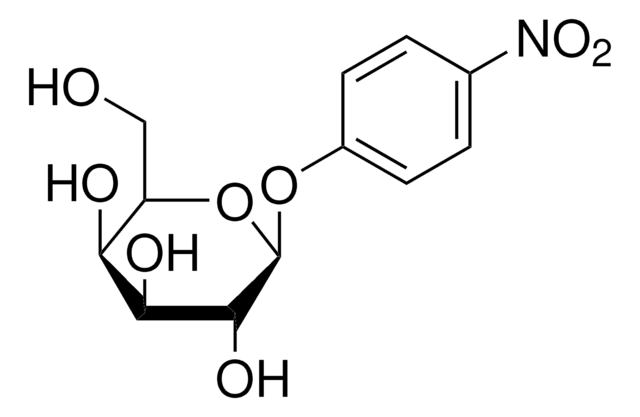N1752
4-Nitrophenyl β-D-lactopyranoside
powder
Synonym(s):
4-Nitrophenyl beta-D-lactopyranoside, p-Nitrophenyl-beta-D-lactopyranoside
About This Item
Recommended Products
Assay
≥99% (TLC)
Quality Level
form
powder
color
white
solubility
water: 19.60-20.40 mg/mL, clear to slightly hazy, colorless to yellow
storage temp.
−20°C
SMILES string
OCC1OC(OC2C(O)C(O)C(OC2CO)Oc3ccc(cc3)N(=O)=O)C(O)C(O)C1O
InChI
1S/C18H25NO13/c20-5-9-11(22)12(23)14(25)18(30-9)32-16-10(6-21)31-17(15(26)13(16)24)29-8-3-1-7(2-4-8)19(27)28/h1-4,9-18,20-26H,5-6H2
InChI key
IAYJZWFYUSNIPN-UHFFFAOYSA-N
Application
Signal Word
Danger
Hazard Statements
Precautionary Statements
Hazard Classifications
Repr. 1B
Storage Class Code
6.1C - Combustible acute toxic Cat.3 / toxic compounds or compounds which causing chronic effects
WGK
WGK 3
Flash Point(F)
Not applicable
Flash Point(C)
Not applicable
Certificates of Analysis (COA)
Search for Certificates of Analysis (COA) by entering the products Lot/Batch Number. Lot and Batch Numbers can be found on a product’s label following the words ‘Lot’ or ‘Batch’.
Already Own This Product?
Find documentation for the products that you have recently purchased in the Document Library.
Customers Also Viewed
Our team of scientists has experience in all areas of research including Life Science, Material Science, Chemical Synthesis, Chromatography, Analytical and many others.
Contact Technical Service











